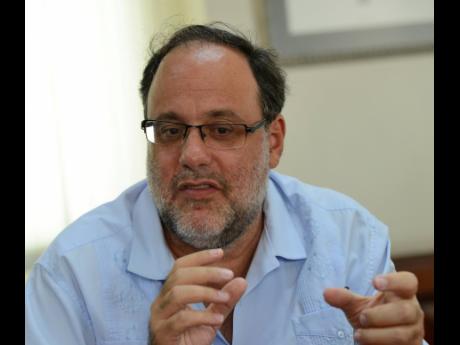Editorial | Mark Golding’s priority
If Mark Golding is embracing good, though unsolicited, advice he won’t engage in undue hand-wringing over the latest opinion polls confirming his and his party’s loss of ground among Jamaican voters. There is no need for spin. That he couldn’t traipse across the island to “connect” with people isn’t really the issue.
The People’s National Party (PNP) has more fundamental problems than the limitations on Mr Golding’s ability to travel caused by COVID-19 restrictions. As we have indicated before, while the PNP’s troubles may manifest as personality conflicts, Mr Golding’s belief that he isn’t sufficiently well known, and now the poll numbers, the party’s crisis is not primarily these issues. Rather, it is about its lack of ideas and philosophy – the sense that the party stands for nothing and has no direction.
Which is the basis for a second bit of advice to Mr Golding, if he is intent on rebuilding the PNP as a viable political party and, critically, into a purposeful institution. Then, he shouldn’t put too much store in the party winning the next general election, due in 2025. That should be his secondary focus – a natural progression from the first concern.
Mr Golding became leader of the 83-year-old PNP 10 months ago, having won an internal election to succeed Peter Phillips. Dr Phillips resigned after the party’s heavy defeat in the general election of September 2020. Mr Golding inherited the PNP’s current crisis, although he wouldn’t claim he didn’t have a hand in at least deepening it. He was in charge of the campaign of his close ally, Peter Bunting, to remove Dr Phillips, who their faction held to be unelectable.
REVIVED OLD CRACKS
Mr Bunting’s challenge ultimately failed, but revived, and exacerbated, old cracks in the PNP which it was able to paper over during its years of government. Mr Golding hasn’t, as yet, been able to heal the wounds from the Bunting challenge or those from his own contest with Lisa Hanna. In fact, there have been new suspicions and further fallouts. Things are made worse by the fact that there is no large common cause, or big idea, around which the party’s adherents rally.
It is against this backdrop that the recent opinion survey for the RJRGLEANER Communications Group by pollster Don Anderson has been published. Support for the leadership of the governing Jamaica Labour Party (JLP) and Prime Minister Andrew Holness slid sharply over the past year, but remains in manageable regions. Last July, Mr Holness’ rating as a good or very good performer was a politically stratospheric 65 per cent, eight percentage points better than those perceptions of his Government. Now ‘only’ 45 per cent of Jamaicans characterise his leadership in those terms. On the other hand, negative (poor, very poor) perceptions of Mr Holness’ leadership has spiralled to 37 per cent, from 10 per cent a year earlier. But neither Mr Golding nor the PNP was able to capitalise on this.
A year ago, Mr Golding wasn’t yet the PNP’s president. When Jamaicans were asked to rate the performance of the opposition leader (Dr Phillips), 46 per cent were clearly negative (poor, very poor), 38 per cent felt he was average and 16 per cent were enthusiastic.
With Mark Golding now in the job, the poor performance rating of the opposition leader remains statistically the same (47 per cent). However, those who believe the opposition leader is doing a good or very good job slipped five points, from Dr Phillips’ 16 per cent to 11 per cent. The party has slipped in similar ranges on the same assessments. Further, while there is a narrowing of the gap between the parties on which people say they would vote for in an election, that’s because of the JLP’s shedding of support, not because the PNP gained.
Mr Golding is right. The PNP’s public squabbles wouldn’t have signalled to voters that it is a party in which they could place their confidence. But how that is fixed is to be resolved. On the public’s rating of his leadership, he said: “From February, really, I have not been around much on the ground, the way we were doing prior to that.”
UNDERLYING ARGUMENT
The underlying argument, it seems, is that he doesn’t have a sufficiently large national profile, which his efforts to build were upset by the COVID-19 measures. So he intends to get back to selling himself and the PNP as a cohesive force. The question for Mr Golding is: What will be on sale?
This newspaper wishes for the PNP to be a viable political party and to be perceived as a credible alternative Government. That is important to Jamaica’s tradition as a liberal, two-party democracy. But we also wish for our parties to have philosophical underpinnings that inform sensible policies. Otherwise, their members and supports coalesce around transactional visions that shift and change and evaporate with the political seasons. When unsustained by a central core political parties don’t easily manage traumas.
The PNP, for good or bad, used to be a party that knew what it was about and for what it stood. It lost its way. Mark Golding can create a lasting legacy by leading the PNP to a rediscovery of a soul, as a party that stands for something. That need not be the vision of the past, but its purpose has to be clearly defined and articulated. Not merely about political office and its trappings.
Though seemingly being conducted in secret, the job being done by the policy commission chaired by Professor Anthony Bogues may provide a platform for the reorientation and revival of the PNP as an intellectually alive, ideas-based party, providing the kind of vision for a 21st century around which its members can coalesce and which other voters may find attractive. That should be Mark Golding’s priority.

